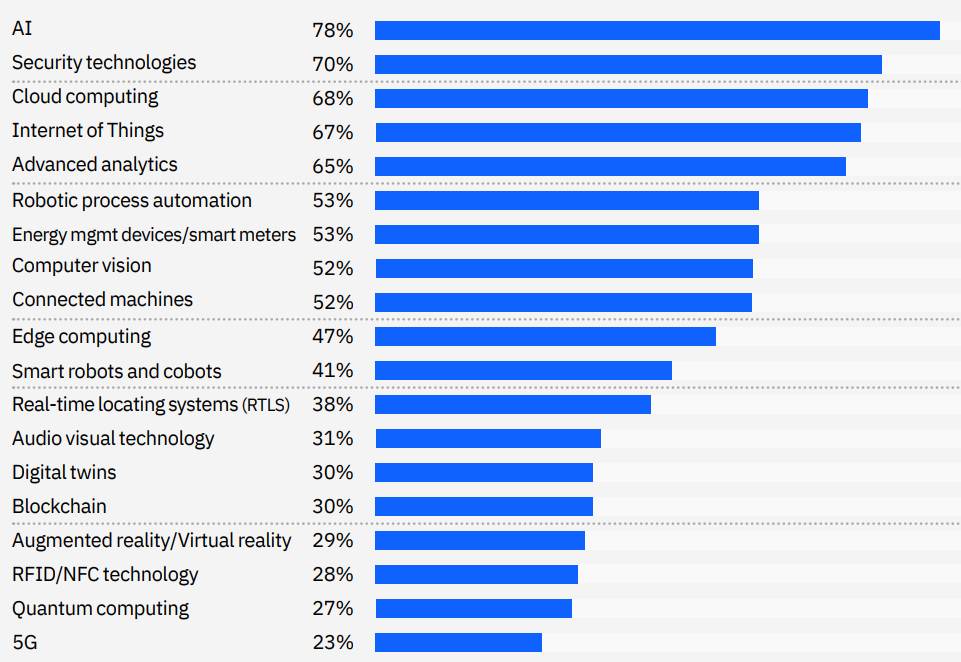In an era marked by rapid technological advancements and global disruptions, the supply chain landscape in the ASEAN region is evolving at an unprecedented pace. In a recent IBM Institute for Business Value report titled The Intuitive Supply Chain, there is growing anticipation of the potential of technologies like artificial intelligence, automation, and AI assistants to transform how supply chains operate.
Technology-lead transformation

As industries grapple with complex challenges, technology emerges as a cornerstone for transformation. Balasubrahmanyam Pappu, partner and head of Sales at IBM Consulting in ASEAN, emphasises that significant advancements in data utilisation are essential for enhancing operational efficiency.
Currently, only 28% of manufacturing organisations in the region effectively leverage the data they collect, and a mere 10% of that data is utilised for meaningful insights. This underutilisation limits the potential for predictive maintenance and operational improvements.
Technologies such as artificial intelligence (AI), the Internet of Things (IoT), and blockchain are reshaping operations. "Advanced analytics and AI are increasingly used for predictive maintenance, helping reduce unplanned downtime," states Pappu.
Furthermore, blockchain technology enhances supply chain transparency, allowing for end-to-end traceability—a critical factor in today’s complex supply networks.
Key challenges facing supply chain leaders
Chief Information Officers (CIOs) must navigate a landscape fraught with challenges, particularly as they approach 2025. Pappu identifies three primary concerns faced by Chief Operating Officers (COOs) in the region:
Supply chain resilience: Recent global disruptions, including the COVID-19 pandemic and geopolitical tensions, have heightened the focus on supply chain resiliency. As Pappu notes, "Supply chain officers are re-evaluating their entire network to adapt to these changes."
Balancing sustainability with profitability: The demand for sustainable practices is increasing, driven by consumer expectations. However, balancing these sustainability initiatives with profitability poses a significant challenge for manufacturers.
Technology-driven talent gap: The rapid adoption of exponential technologies requires a skilled workforce. Pappu highlights the urgent need for organisations to elevate the skills of their employees to meet these demands effectively.
Innovations in supply chain management
CIOs should also take note of the innovative technologies being implemented across the region. Pappu points to various successful use cases that illustrate how organisations are leveraging technology to enhance their supply chains.
For instance, predictive maintenance powered by generative AI allows electronics manufacturers to create synthetic data for training models, improving equipment failure predictions and reducing downtime.
Additionally, knowledge management systems have become essential tools for field technicians and customer service representatives, providing real-time access to operational data. Pappu believes that it is much easier to create comprehensive product manuals, which can now be translated and personalised for customer preferences.
The transformative impact of Generative AI
Generative AI is set to revolutionise supply chain efficiency and decision-making in the ASEAN region. Pappu explains that IBM's Watson X platform enables manufacturers to harness the power of generative AI across various applications. For example, in product development, AI-powered knowledge discovery accelerates innovation by unlocking insights from extensive industrial data repositories.
Moreover, generative AI enhances quality control by integrating visual recognition capabilities, significantly improving defect detection processes. "This technology can analyse thousands of images, dramatically improving the quality assurance process," he asserts.
Navigating supply chain complexities
IBM Consulting plays a pivotal role in helping COOs navigate the complexities of supply chain management. Pappu describes a shift towards a new consulting paradigm, where evidence-based strategies replace opinion-based approaches. This evolution allows consultants to leverage IBM's intellectual property and technology to enhance expertise.
Pappu highlights a successful initiative in partnership with Singapore Management University, where IBM developed a supply chain risk management framework, yielding over $30 million in benefits. Furthermore, skills development is a priority, with IBM collaborating with local universities to train over 4,500 individuals in cloud computing, AI, and data analytics.
Evolving relationships in the supply chain
As the landscape shifts, Pappu anticipates significant changes in how manufacturers in ASEAN will interact with customers, suppliers, and employees. For customers, enhanced personalised cooperation will emerge, driven by AI and analytics that facilitate a deeper understanding of consumer needs. Augmented reality may allow customers to virtually test products before purchase, improving the overall buying experience.
Supplier relationships are expected to become more collaborative and transparent, with blockchain and IoT enabling real-time visibility. Pappu envisions a future where data sharing optimises the entire value chain, enhancing efficiency and responsiveness.
Moreover, the integration of human and machine collaboration will redefine employee roles. Pappu notes that AI and robotics will augment human capabilities, improving worker safety and job satisfaction. However, he cautions that this transition must be carefully managed to address fears of job displacement, particularly in regions with large manufacturing bases.
Readying for the future today
The IBM Institute of Business Value report, Manufacturing 4.0: From data to decisions, reveals the top technologies manufactureres deem important to advance their manufacturing objectives.

As we look toward 2025, several key trends will reshape supply chain operations in ASEAN. Pappu highlights the convergence of AI, IoT, and edge computing as a game-changing force, enabling even smaller manufacturers to compete effectively. However, this transformation requires significant investment in technology and data management capabilities, alongside new cybersecurity measures to protect against increasing threats.
CIOs must also consider the ethical implications of AI-driven decisions, ensuring transparency and accountability in their operations. Success in this new paradigm will necessitate a balanced approach that leverages technology while investing in workforce development and considering broader societal impacts.
Despite the continuing uncertainty, the future of supply chains in the ASEAN region is bright albeit complex. By embracing technological advancements and addressing the challenges ahead, CIOs can position their organisations for success in this rapidly evolving landscape. As Pappu aptly summarises, "Organisations that can navigate this complexity while thinking globally will thrive in 2025 and beyond."


